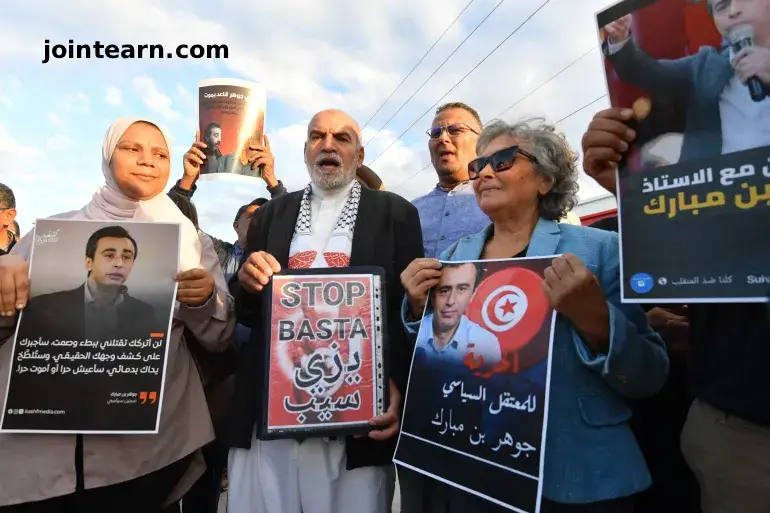
The health of jailed Tunisian opposition figure Jawhar Ben Mbarek has sharply deteriorated after more than two weeks on hunger strike, prompting an emergency hospitalisation, his family announced on Friday. Ben Mbarek, a leading critic of President Kais Saied and co-founder of the National Salvation Front, has been refusing food since October 29 in protest of his prolonged imprisonment.
Family Warns of ‘Dangerous Toxin’ and Severe Dehydration
In a Facebook post, Ben Mbarek’s sister Dalila Ben Mbarek Msaddek described a dramatic decline in her brother’s condition. She said doctors treating him had detected “a highly dangerous toxin” affecting his kidneys, and that he was suffering from severe dehydration.
He was transferred to hospital late Thursday, where he accepted medical treatment but refused nutritional supplements, insisting on continuing his hunger strike—now in its 17th day. According to Msaddek, he was discharged Friday afternoon and returned directly to prison despite his fragile health.
Lawyer Alleging Beatings and Torture in Prison
Concerns for Ben Mbarek’s safety intensified earlier this week after his lawyer, Hanen Khmiri, accused prison guards of physically assaulting him in an attempt to force an end to his hunger strike.
“He was severely beaten, we saw fractures and bruises on his body,” Khmiri told reporters, adding that the assault took place in an area of the prison with no surveillance cameras. She confirmed filing a complaint with the public prosecutor, who has promised to investigate the allegations.
A Leading Opponent of President Kais Saied
Ben Mbarek has long been one of the most vocal opponents of President Saied, who has tightened his grip on power since dissolving Tunisia’s parliament in 2021. Rights groups say his government has overseen an unprecedented crackdown on political rivals, journalists, and civil society figures.
In April 2025, Ben Mbarek was sentenced to 18 years in prison on charges of “conspiracy against state security” and “belonging to a terrorist group.” The charges were part of a mass trial widely condemned by local and international rights organisations as politically motivated. Ben Mbarek has consistently rejected the accusations, calling them fabricated and intended to silence opposition.
Tunisia’s Shrinking Civic Space Under Saied
Human rights defenders warn that Tunisia has witnessed a deep erosion of civil liberties since Saied’s power grab. The president has ruled largely by decree since 2021, and the controversial 2022 constitution—passed in a referendum boycotted by the majority of voters—further expanded his powers.
Journalists, lawyers, and activists critical of the government have been prosecuted under a sweeping “fake news” law, which rights groups say is used to intimidate dissenters and stifle free expression.
Opposition Figures Launch Collective Hunger Strike in Solidarity
In response to Ben Mbarek’s deteriorating condition, several prominent Tunisian political figures have begun their own hunger strikes. Among them is Issam Chebbi, head of the Al Joumhouri (Republican) Party, who is also imprisoned following the same mass trial earlier this year.
Rached Ghannouchi, the 84-year-old leader of the Ennahdha Party and one of Tunisia’s most influential political figures, also announced he would join the collective strike. The current health status of Chebbi and Ghannouchi remains unclear.
Prison Authorities Reject Abuse Claims
Tunisian prison authorities continue to deny any wrongdoing. Officials say all detainees are under “continuous medical supervision” and dismiss allegations of torture or declining health as “rumours.”
However, rights organisations argue that the situation reflects a broader pattern of authoritarian consolidation under Saied, sparking growing domestic and international concern.
As Ben Mbarek’s hunger strike enters a critical phase, activists warn that his life now hangs in the balance—turning his protest into a symbol of Tunisia’s escalating political crisis.


Leave a Reply